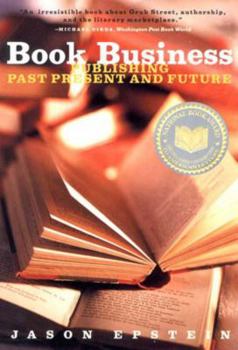Book Business Publishing: Past, Present, and Future
Select Format
Select Condition 
Book Overview
Jason Epstein has led arguably the most creative career in book publishing during the past half-century. He founded Anchor Books and launched the quality paperback revolution, cofounded the New York Review of Books, and created of the Library of America, the prestigious publisher of American classics, and The Reader's Catalog, the precursor of online bookselling. In this short book he discusses the severe crisis facing the book business today--a crisis...
Format:Paperback
Language:English
ISBN:0393322343
ISBN13:9780393322347
Release Date:January 2002
Publisher:W. W. Norton & Company
Length:226 Pages
Weight:0.50 lbs.
Dimensions:0.7" x 5.5" x 8.5"
Related Subjects
Arts & Literature Authors Biographical Biographies Biographies & History Biography & History Book Industry Books & Reading Business Business & Finance Business & Investing General History of Books Humanities Industries & Professions Language Arts Literary Criticism Literary Criticism & Collections Literature Politics & Social Sciences Publishing & Books Reference Reference & Collections Social Sciences Textbooks Writing, Research & Publishing GuidesCustomer Reviews
3 ratings
An intresting journey into the history of book publishing
Published by Thriftbooks.com User , 20 years ago
The world of book publishing and all of its adjunct business like book superstores, are an interesting yet hidden mystery. (Or at least I feel that way)The author takes through the journey of publishing and his life, which are tightly intertwined. He starts with the early and maybe exciting years of publishing in the 50's -60's to the movement of paperbacks to quality and outside the drug store. Along the way he also shares with us his prospective on the current book publishing/selling/writing situation around us. While I don't want to say much about this part, he doesn't paint a good picture of the overall situation. But then after describing the current situation he takes to his idea, vision, and hope for the future of publishing were authors would sell directly to readers.This is a fun and educational book to read for any book lover. I high recommend it to everyone.
Glimpsing the Future of Books
Published by Thriftbooks.com User , 22 years ago
In book publishing since 1950, Jason Epstein knows firsthand the problems the industry has faced over the years and how recent technological advances are about to bring a much-needed change. And though this may seem boring on the surface, read on, for according to Epstein, the future of book publishing is about to change dramatically.No stranger to innovation, Epstein launched The New York Review of Books, and the Library of America, in addition to creating Doubleday's Anchor Books, the imprint that started the quality trade paperback revolution. Now he envisions another revolution, but he's not talking about electronic books (e-books). In the preface to Book Business, Epstein says, "Technologies change the world but human nature remains the same," which seems to sum up how most readers feel about e-books. You can't replicate the experience of curling up with a good book if you're glued to a computer screen or fumbling with a stack of loose-leaf printed pages. What he is talking about is print-on-demand (POD) publishing - technology that is capable of transferring book text electronically to book kiosks which will be able to print and bind a finished book, either in a central location or, eventually, in your own home. Joining Random House in 1958, when the company was housed in New York's Villard mansion, Epstein witnessed an exciting part of book publishing history. He recounts tales of W. H. Auden showing up unannounced "in torn overcoat and carpet slippers delivering the manuscript of The Dyer's Hand"; Theodore Geisel (Dr. Suess) "arriving with his storyboards to recite Green Eggs and Ham"; and Andy Warhol "bowing slightly and addressing me in a deferential whisper as Mr. Epstein, as if I were not someone in a torn sweater and corduroy trousers hardly older than he was...."Epstein elucidates a time in New York after the Second World War when the sounds of Johnny Mercer and Ella Fitzgerald could be heard at the Vanguard or Café Society and, if you had a few pennies, you could enjoy a beer while you were listening.But irregardless of the social opportunities it affords, Epstein asserts that publishing, by its nature, is not suited to becoming a commercially viable enterprise, and that attempts at making it so have oft led to disappointment, since the publishing paradigm includes allowing booksellers to return unsold stock for full credit. When he was at Doubleday, Epstein later learned, the company's treasurer was advising its owner to sell the business and invest the proceeds in government bonds, arguing that this would yield a greater profit. "The book business as I have known it," Epstein confesses, "is already obsolete."Meanwhile, the marketplace has come to be monopolized by superstores, whose accompanying high overhead costs require high turnover. The trouble started with the migration from cities to suburbs, since the only place booksellers could set up shop in the suburbs was in the malls, where high rent precludes the profitable operati
Just enjoy
Published by Thriftbooks.com User , 22 years ago
Unfortunately it isn't a book that'll help us understand how to set up and run a business sucessfully. Let alone the book or any media business, all that carry a huge ammount of sheer luck or "right place at the right time" in its record of achievements. Mr. Epstein shows the way through a business in which projections and assurance simply don't exist. It is the true business of risk and good sense. It won't show you how to succeed but again no book will. But it will entertain you an awful lot and hopefully make you want to be part in this great and demanding profession.




